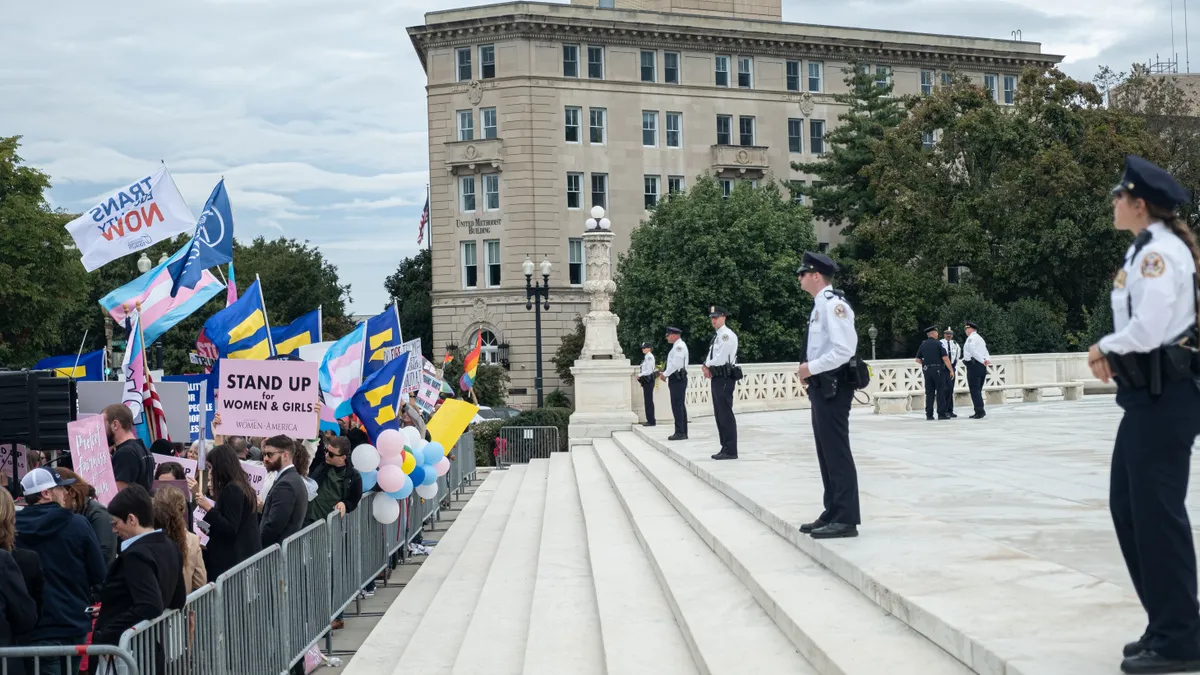Dive Brief:
- The U.S. Supreme Court ruled Monday that gay, lesbian and transgender people are protected under Title VII of the U.S. Civil Rights Act of 1964, which bars job discrimination because of reasons including sex, the Associated Press reports.
- In the 6-3 ruling, which saw Chief Justice John Roberts and Justice Neil Gorsuch side with the court's liberal justices, Gorsuch wrote, "An employer who fires an individual for being homosexual or transgender fires that person for traits or actions it would not have questioned in members of a different sex," adding that those traits' "necessary and undisguisable role" in such a decision is precisely forbidden by Title VII.
- In the ruling, the court also signaled a willingness to hear cases on transgender bathroom rights, which have been a topic of contention for a number of school districts nationwide. Gorsuch wrote that the court doesn't aim to address bathrooms, locker rooms "or anything else of the kind" under Title VII, noting, "[W]e have not had the benefit of adversarial testing about the meaning of their terms, and we do not prejudge any such question today."
Dive Insight:
Schools have been no stranger to allegations of transgender discrimination: In a 2018 NPR Ed survey of 79 transgender and gender-nonconforming teachers, 56% reported facing harassment or discrimination at work. This included 20% reporting verbal harassment and 17% reporting they were asked to alter their dress or other presentational qualities.
As our sister publication HR Dive reported, the ruling consolidates three cases — Bostock v. Clayton County, Georgia; Altitude Express, Inc., et al. v. Zarda, Melissa, et al. and R.G. & G.R. Harris Funeral Homes v. EEOC, et al. — and addresses one of the highest-profile debates in U.S. employment law, which resulted in a split between circuit courts and agency clashes.
Of the ruling, National Education Association President Lily Eskelsen Garcìa said, "This means that educators can no longer be fired at work for who they love or who they are. And since LGBTQ discrimination is sex discrimination under employment discrimination law, it also follows that federal laws proscribing sex discrimination in education and health care also prohibit LGBTQ discrimination. This means that our LGBTQ students will also be protected under federal law from discrimination at school."
With the ruling suggesting a willingness to examine transgender bathroom policies, a similar split among the justices in such a case could overturn the Trump administration's reversal of Obama-era guidance protecting transgender students’ rights to access bathrooms and facilities of their choosing. Cases such as Gloucester County School Board v. G.G. have for several years bounced between the lower courts, a significant number of which have continually decided in favor of transgender and nonbinary students.
“In March of 2017, Secretary [Betsy] DeVos told me that she was waiting for the courts to rule clearly before she would protect transgender students as they deserve," GLSEN Executive Director Eliza Byard said in a statement. The organization is focused on increasing LGBT inclusion and awareness, as well as eliminating discrimination, harassment, and bullying based on sexual orientation and gender identity, in K-12 schools.
"Today, the Supreme couldn't have been more clear, ruling that 'it is impossible to discriminate against a person for being homosexual or transgender without discriminating against that individual based on sex," Byard said. "Secretary DeVos must immediately reverse her attacks on transgender students’ rights, which began with her very first official actions in 2017. Now, she can no longer hide behind the claim of waiting for the courts."
The U.S. Department of Education said it is reviewing the court's opinion.













